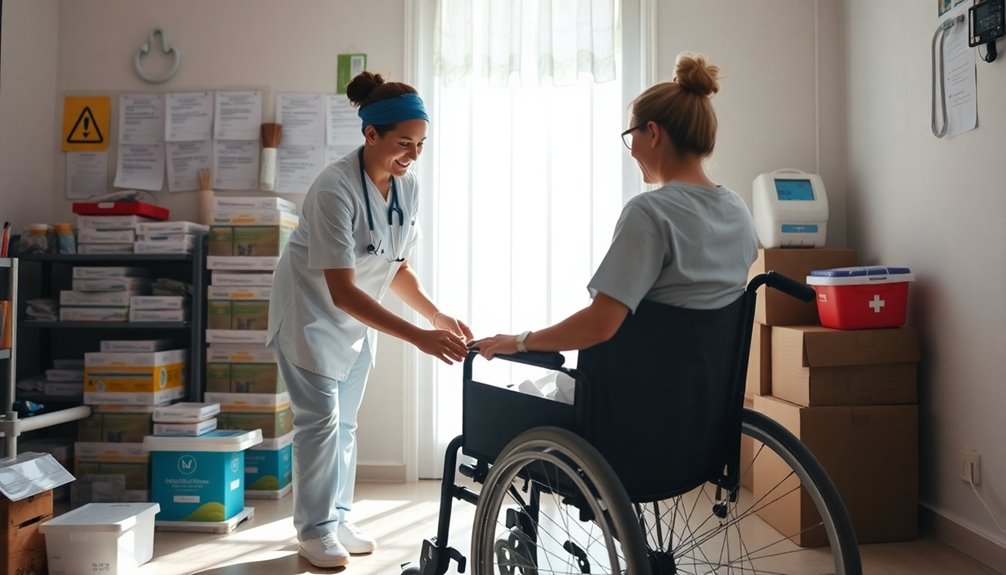Caregivers aren't typically covered under insurance unless they provide medically necessary services through Medicare. Medicare may pay for home health aides, skilled nursing care, and therapy if you meet specific conditions. Coverage varies based on your plan, with some options offering supplemental assistance. If you're curious about the different types of caregiver support or financial help available, you'll find plenty of useful information here.
Key Takeaways
- Medicare covers home health services for beneficiaries who need medically necessary care, but custodial care is not included without a doctor's plan.
- Part A requires a three-day hospital stay for skilled nursing coverage, while Part B covers home health services without prior hospitalization.
- Caregiver services must be provided by Medicare-approved agencies to qualify for insurance coverage.
- Financial assistance programs may be available for low-income seniors and family caregivers in certain states.
- Medigap and Medicare Advantage plans can help cover out-of-pocket costs for home health services not covered by Original Medicare.
Understanding Medicare Coverage for Caregivers

How can you navigate Medicare coverage for caregivers?
First, understand that Medicare covers home health services if the beneficiary is homebound and requires medically necessary services. Under Medicare Part A, coverage kicks in after a three-day hospital stay, while Part B covers those without prior hospitalization.
You can access skilled nursing care, physical therapy, and intermittent home health aide assistance through a Medicare-approved home health agency.
However, keep in mind that custodial care and daily living assistance aren't covered unless specified in a doctor-issued plan of care. For eligibility, care must be limited to fewer than eight hours per day and 28 hours per week, ensuring support for essential activities of daily living is met.
Types of Medicare Plans and Their Benefits

When exploring your options, understanding the different types of Medicare plans and their benefits is essential for securing the right coverage.
Here's a quick overview of the key plans:
- Medicare Part A: Covers skilled care and home health services after a hospitalization of three days or more.
- Medicare Part B: Provides coverage for medically necessary home health services, including personal care, without prior hospitalization.
- Medicare Advantage Plans: Incorporate benefits from Parts A and B, often expanding coverage for home health, but may limit you to in-network providers.
- Medigap: Supplemental insurance that helps with out-of-pocket costs related to home health services, though not for non-medical care.
Understanding these options can help you and your family caregivers make informed decisions.
Evaluating Caregiver Qualifications

When you're considering a caregiver, it's essential to understand the different types and their qualifications.
Personal care aides, home health aides, and skilled nursing providers all have unique training and certification requirements that impact the level of care they can provide.
Types of Caregivers
There are several types of caregivers, each with unique qualifications tailored to meet the specific needs of beneficiaries.
Understanding these roles can help you choose the right support for your care services:
- Home Health Aides – Assist with daily living activities under the supervision of a medical professional, often qualifying for insurance coverage.
- Skilled Care Providers – Registered nurses and licensed therapists provide specialized medical care, addressing complex medical needs.
- Professional Therapists – Physical and speech therapists deliver rehabilitation services and hold appropriate credentials for their practice.
- Social Workers – Focus on emotional and social needs, requiring a master's degree in social work and state licensure.
Certification and Training Requirements
Understanding the certification and training requirements for caregivers is essential for ensuring quality care. Caregivers providing skilled services must be certified and often hold licenses, like registered nurses or licensed practical nurses, depending on the care needed. Home health aides typically require training and certification, covering basic first aid, CPR, and personal care skills. Professional therapists, such as physical or occupational therapists, must have relevant degrees and licenses to meet state and federal standards. Social workers involved in home health care need a degree in social work and must be licensed to provide medical social services. Family members can become self-directed caregivers after completing assessments and training on specific caregiving tasks, ensuring they're equipped to provide the necessary support. Additionally, understanding the importance of long-term financial planning for caregiving can significantly impact the sustainability of care provided.
Finding and Hiring a Caregiver

How do you guarantee that the caregiver you hire meets your needs? Start by ensuring the agency is Medicare-approved, as this will help cover home health services for Medicare beneficiaries.
Use Medicare's provider search tool to find licensed agencies that fit your criteria. Here's a quick checklist to streamline your process:
- Verify the agency's Medicare certification.
- Conduct thorough interviews and use assessment sheets.
- Review caregiver performance regularly for ongoing suitability.
- Be aware that only one home health agency can be used at a time.
Cost Considerations for In-Home Care

When considering in-home care, it's important to understand the limits of Medicare coverage, as it typically only covers medically necessary services.
You'll also notice that costs can vary considerably based on where you live and the type of care you need.
Being aware of these financial aspects can help you plan better for your caregiving expenses. Additionally, exploring structured meal plans can help caregivers manage their own health while providing care, as proper nutrition plays a vital role in maintaining energy levels.
Medicare Coverage Limits
While steering through the complexities of in-home care, it's crucial to know Medicare's coverage limits, especially regarding costs.
Medicare coverage for home health care includes:
- Skilled nursing services: Covered under Part A after a three-day hospitalization.
- Therapy services: Medically necessary treatments can be covered under Part B without prior hospitalization.
- Homebound certification: A physician must certify you as homebound to qualify for these services.
- Supplemental plans: Medicare Advantage or Medigap plans can help reduce out-of-pocket expenses not covered by Original Medicare.
Keep in mind that Medicare won't cover custodial care or assistance with daily living unless deemed medically necessary, which can impact caregiver costs considerably.
Geographical Cost Variations
Understanding geographical cost variations is essential for anyone considering in-home care, as these expenses can greatly impact your budget.
Care costs can vary considerably based on your geographic location. For example, the monthly median cost for in-home caregivers was $4,481 in 2020, but in the Inland Empire, a home health aide averages $5,302.
If you're looking for skilled care, nursing home costs can soar to $9,305 for private rooms. Evaluating these figures against your insurance policy is critical.
Medicare coverage and Medicare Advantage may help, but they often don't cover all care costs. It's important to consult with your home health agency to understand your options for your loved ones while keeping your budget in check.
Coverage for Medical Supplies and Equipment

Many caregivers find maneuvering insurance coverage for medical supplies and equipment challenging. Understanding what's covered can save you stress and money. Here are some key points to take into account:
- Medicare Part B covers certain durable medical equipment (DME) like wheelchairs and oxygen equipment if prescribed by a physician.
- You're usually responsible for 20% of the Medicare-approved amount after meeting your deductible.
- Medical supplies, such as bandages and catheters, can be covered under Part B when deemed necessary.
- Coverage may vary with different Medicare Advantage plans; always check your specific plan for details.
Additional Financial Assistance Options

If you're feeling overwhelmed by the financial demands of caregiving, know that there are various assistance options available to help ease your burden.
Medicaid can offer financial assistance for eligible low-income seniors needing home care services. Additionally, some states provide specific programs to support family caregivers financially.
If you're a veteran, you may qualify for veterans benefits that can help with home care costs and support services. The PACE program delivers extensive health coverage, including home care services for qualifying individuals.
To explore your options, consider requesting free assessments from local home care agencies. They can help you understand the insurance options available and connect you to the financial assistance you need as a caregiver.
Frequently Asked Questions
Does Medicare Pay for a Home Assistant?
Yes, Medicare can pay for a home assistant, but there are specific criteria.
If you're homebound and have a doctor's order, you might qualify for coverage.
Medicare Part A covers home health care after a hospital stay of three days or more, while Part B covers services without prior hospitalization.
How Much Does Social Security Pay a Caregiver?
Imagine a caregiver's hands, gently providing support and comfort—yet, you might wonder, how much does Social Security actually pay a caregiver?
While Social Security doesn't pay caregivers directly, it can provide financial assistance to those receiving care, helping them afford in-home support.
If you're eligible, look into Medicaid programs that might offer compensation for family members or friends.
The specific amount varies by state, but it can be a lifeline for dedicated caregivers.
How Much Do Family Members Get Paid for Caregiving?
If you're providing care to a family member, you might get paid between $10 and $25 per hour, depending on your state and the specific program you're involved in.
On average, family caregivers typically earn around $13 an hour through various compensation programs.
Some states even have initiatives like Cash and Counseling that could help you receive financial support for your caregiving efforts.
It's worth exploring all available options for compensation.
How Long Does Medicare Cover Caregivers at Home?
Medicare mainly manages meaningful moments for your healthcare.
If you qualify, it can cover home health services for up to 100 days after a qualifying hospital stay. However, you must be deemed homebound and require skilled care or therapy.
Remember, home health aides are only covered when part of a broader plan that includes skilled nursing or therapy.
Always stick to your doctor's plan to maintain eligibility for Medicare's essential support.
Conclusion
In summary, steering caregiver coverage can be tricky, but knowing your options helps. Did you know that nearly 34 million Americans provide unpaid care to an adult age 50 or older? This statistic highlights the vital role caregivers play in our lives. Whether you're considering Medicare or looking into other financial assistance, understanding the resources available can make a big difference in ensuring quality care for your loved ones while also easing your own financial burden.









